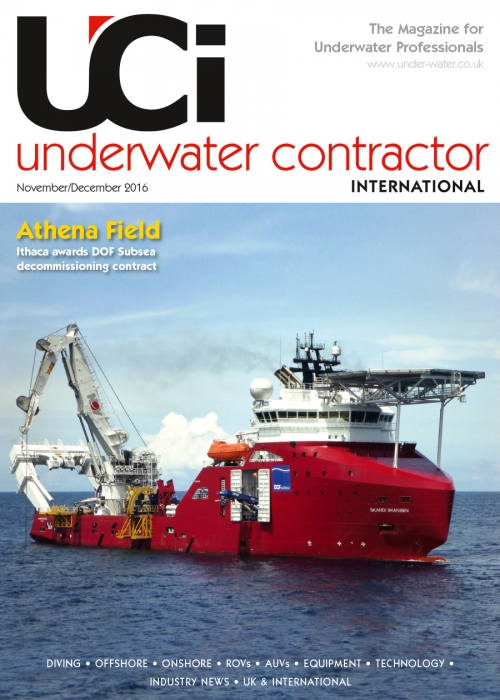
The Magazine for Underwater Professionals
![]() Sep/Oct 2014
Sep/Oct 2014
COCKS' COLUMN
Underwater world is clouded by political uncertainty
I apologise in advance for returning a little more than usual to my political roots. But with a UK general election little more than seven months away (with the UK Independence Party making a forecast of the result nigh on impossible) and, at the time of writing, the result of the Scottish independence referendum on whether Scotland remains part of the United Kingdom pending, the future for the UK underwater world is even more uncertain.
A problem I have highlighted in the past is the sharp rise in costs for recovering oil and gas, with more discoveries at depth, and the problems of a shortage of skilled workers, contrasting with a weak oil price. Shell UK has recently announced it is to cut 250 jobs in Aberdeen, following a similar announcement by Chevron. On the other hand, industry analyst Douglas-Westwood thinks the long decline in development wells on the North Sea will be reversed, and two buy out groups will provide US$500 million for investing there.
GROWTH
I have been reassured by the increasing growth in criticism of wind power and the growing success of the much more consistent wave and tidal power; a GB£50 million tidal stream development has been announced in the Pentland Firth. I hope that after our general election the bleatings of the Green brigade will lessen and the government will look more closely at fracking, with compensation given to those under whose land the process takes place, and also at carbon capture and the storage of the resulting gas under the North Sea.
It was good to have my first dive for some time in Plymouth, with the new Commercial Diver Training Ltd school, during the deep phase of its HSE Surface Supplied Diver course. I was accompanied underwater by my commercial diving doctor, Dr Maarten Van Kets, a qualified commercial diver. The equipment was first-class and the instruction thorough. In order to see how diver training takes place at the earlier stages of the course, I will be returning to Fowey in Cornwall this month, as the students undertake the use of subsea tools. I will produce a full article on my experiences and observations in the next issue of UCi.
The war of words on the amount of oil and gas still to be recovered in British waters has intensified. However, I would rather believe the words of Sir Ian Wood than the posturing of Alex Salmond. Sir Ian has said that there are only between 15 and 16.5 billion barrels left, although some other estimates are higher, with the Scottish Nationalist estimate being around 50% larger. This warning follows the forecast by the Office for Budget Responsibility that dwindling North Sea revenue will increase pressure on government finance over the coming decade. It is a pity the rest of Scotland has not followed the example of the Shetland “government” and set up an Oil Wealth fund, along the lines of that in Norway. Its value should rise by the end of this decade to more then GB£300 million. No wonder the Shetlands and Orkneys do not share Alex Salmond’s enthusiasm for a dash for independence. To my mind Scotland already has been promised too many new powers.
Around the world it is proving necessary for energy companies to attempt to control sharply rising costs, with a declining oil price and rising skills shortages, with ex military personnel being tapped for work on the North Sea.
FORECAST
On a more cheerful note, Douglas-Westwood has recently forecast that the world oilfield services market will rise from US$354 billion in 2014 to US$521 billion in 2018. Norway and Russia have high hopes of major oil and gas discoveries in Arctic waters, where Shell may restart drilling. Drilling is to begin off the Canaries and Colombia. More significant finds are likely in the Mediterranean, with Circle Oil finding more oil off Tunisia. The Mexican Congress has approved sweeping changes to the country’s energy industry, with private oil contracts awarded for the first time since 1938. Royal Dutch Shell has recently discovered 100 million barrels of oil in the Gulf of Mexico, its third big find in the area. The John Wood Group has once again shown it is possible to make large returns in the energy area, having increased its annual dividend by 20% a year since it became a public company.
Now to end on one of my favourite subjects – the high cost of wind power. As I have mentioned, I have been delighted by the increasing successes of wave and tidal power, in which Britain is the world leader. I have recently read that the British government has had to pay GB£11 million to a Spanish wind farm company operating a wind farm ten miles from Glasgow, double what it would have received for producing energy, to stop the electricity network becoming overloaded. More positively, it has been reported that seals are taking advantage of offshore wind farms to forage for food. Belatedly, as I have mentioned in the past, the government is justifiably cutting back the subsidies for wind energy.
So with the UK economy continuing to outpace most others and Ed Miliband likely to become more like his cartoon character, the outlook for caring capitalists like myself is likely to flourish and I hope to mark the reaching of my 25th year in the commercial diving world still being able to venture under the water.


